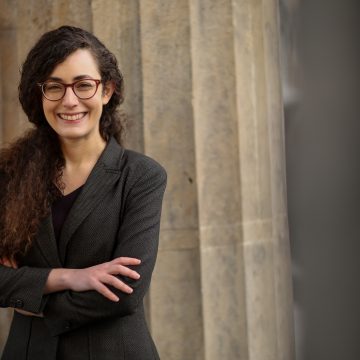PLAY
Kidesh Hashem
[Kiddush Hashem [Martyrdom)]Synopsis
Act 1. Mendel and his wife Yocheved live with their only child Shlomele, a boy of eight, in the Ukrainian town of Zlochov, which Mendel has leased from the Polish feudal lord, Pan Konitz-Polski. They are the only Jews in Zlochov, other Jewish settlers being kept away by the absence of a synagogue and cemetery. As the play begins there arrives a strolling Jewish tailor–a mysterious being who typifies the Jewish conception of saintliness and kindliness. He prophesies that before long Zlochov will have a Jewish community and synagogue with Mendel as its Parnas (lay leader).
At a gay fete at the castle of Pan Konitz-Polski, Mendel and Shlomele entertain the pleasure-mad guests of the Polish feudal lord. In appreciation of their singing, Pan Konitz-Polski offers to grant Mendel any favor he may ask. The latter begs permission for a synagogue and a cemetery. The Polish lord grants permission only for the synagogue and on condition that Mendel either give a prayer to the Holy Virgin or allow himself to dance like a bear while the guests whip him. Mendel chooses the latter.
Within two years a large Jewish community has sprung up in Zlochov, under the leadership of the indefatigable Mendel, now Parnas, and a synagogue is about to be dedicated, with a famous rabbi, “Sha’ar Tzedek,” as its spiritual head. Simultaneously, young Shlomele and the eleven-year-old Deborah, only child of the Sh’ar Tzedek, are to be married. The Little Tailor is present.
Leah, the bath-attendant, is busy at the Rabbi’s house persuading little Deborah to have her hair cut off.
Little Shlomele and Deborah are now man and wife. Mendel is getting ready to start out on the long journey to Lublin, where Shlomele is to enter the rabbinical academy and remain until he is ordained. Deborah threatens to go back to her parents if Shlomele leaves, but consents to remain at home when Shlomele promises to bring her a pair of golden slippers and a gold chain.
‘ Six years later, Bogdan Chmielnicki, escaped from prison, has been smuggled into Mendel’s house while the latter is away. Here Chmielnicki lays plans for an insurrection against the Polish overlords of Ukraine, while Stephen Kratkov, a guzzling priest, sends an attractive Cossack woman to help him while away the time.
A number of Jewish merchants are making merry at a wayside inn. The insurrection has broken out in Ukraine and is regarded by them as the war between Gog and Magog, which, according to tradition, heralds the coming of the Messiah. As Mendel and his son, now an ordained rabbi, arrive, the Little Tailor is rebuking a preacher who is attempting to disprove the Messianic hopes.
Act II. Mendel and his son arrive from Lublin as Yocheved and Marusha are preparing the bridal chamber for Shlomele and Deborah. The latter, who has been away all these years, living with her parents, arrives shortly after. Left alone, Deborah shyly asks whether he has kept the promise he made her when they parted, and Shlomele, ravished by her beauty, hands her the golden slippers.
As the Jews of Zlochov assembled in the synagogue, a messenger arrives bringing word of Chmielnicki’s defeat of the Polish generals, and urges the Jews to flee for their lives. All leave except Mendel and his family. Thereupon the Little Tailor sets the synagogue on fire, saying that human lives are more previous than sticks and stones.
The Jews have taken shelter in a fortress, which they defend with the help of a few hundred Polish soldiers. The Little Tailor, disguised as a Cossack musician, appears and urges the Jews to save themselves by crossing the river. Marusha dresses Deborah in a Cossack costume and she takes a tearful farewell from Shlomele. Betrayed by the Poles, the Jews heroically try to defend the gate against the assault of the enemy.
After four weeks of assault, Chmielnicki tries to trick Marshall Donimick into believing that it is not the Poles but the Jews he is fighting and that he will make peace if they will open the gates of the city to the Cossacks. Shlomele, a prisoner, is sent to the camp of Murad Khan as Chmielnicki is summoned to a peace parley. Krilka and Yerem cast dice for the possession of Deborah, also a captive, and the kindlier Yerem kills Krilka when he finds he has cheated.
Deborah is a prisoner of the love-smitten Yerem, who has promised not to molest her until her period of mourning has passed. He presents her with a pair of golden slippers, which she recognizes as those Shlomele had brought her from Lublin. Believing this to mean her husband has perished, she prepares to meet him in heaven and becomes transfigured with a supernal radiance. Yerem believes she is the Holy Virgin returned to earth. His friends demand a miracle as proof of her divinity. Deborah persuade Yerem to fire his gun at her, assuring him it cannot harm her. As he does, she falls dead, while the Little Tailor appears with a peddler’s bag and signs a song of Faith.
The Polish commanders, not realizing they, too, are marked for slaughter by the wily Chmielnicki, induce the Jews to part with their money and other valuables. When they are asked to give up their arms, the Jews suspect foul play and threaten to kill their betrayers. Suddenly the Little Tailor appears again and reminds them that if they slay the Poles other Jews will suffer for it tenfold and urges them to save their strength for the supreme ordeal: death for Kiddush Hashem (sanctification of God’s name). The Jews are transfigured by his words and permit the Poles to disarm them and to open the gates to the enemy, as they almost joyously go forth to meet a martyr’s death.
Synopsis adapted from a Yiddish Art Theater program by Sonia Gollance.
